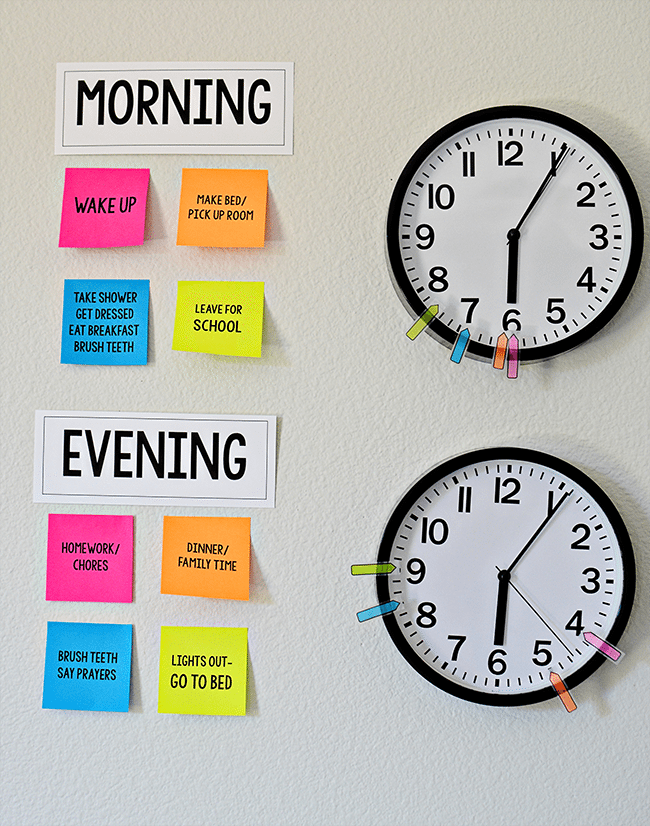The day we don’t have our morning cup of tea or coffee, so many of us feel disoriented, or when a meeting gets cancelled, it throws our day completely. If so little can throw us even with our understanding of the way the world works, imagine the significance of a sudden change in a toddlers life, especially when they are still testing the world with every action and trying to understand the consequences and the way things work.
Routine! That’s your answer to enabling a child to cope with the way the world works.
You may also like: This one DIY will help your child to stick to their routine
Why establishing a routine is important for a child
We all thrive on predictability and children between the ages of 0-6 years depend on routine even more. When you establish a routine, you give the child a sense of control over their day; you allow them to prepare themselves for what is to come. You help them discover mechanisms they can use to be able to cope with change.
Routine is as much needed for the parent as it is for the child. In fact, I think it’s more important for us as parents. Given busy schedules, routines allow us to plan our lives with our children and ensure that our children are getting adequate amounts of every thing vital to their growth and development – sleep, food, play time, one–on–one parent time, reading, etc. Routine allows us to better understand our children and their needs.
Just eating and sleeping
A huge part of what routine consists of in the early years is meal and sleep times. Meal times when missed, make children not just hungry but irritable, we all know then spirals into a whole host of other problems. When a child is not adequately rested, their brains and their bodies find it tough to cope and function. A well-rested child is truly a happy child.
It’s never too young to establish a routine. Start with the simple ones. With a baby the first routine you will be establishing is bedtime. How do you signal to a 3-4 month old that from all the hours they sleep in a 24-hour cycle there is one that is different? At home, we started with a simple routine, one we still use today but with a few modifications of course.
You  may also like: How to get your kids to bed early and reclaim your sanity
Bed Time Routine  (3 months onwards)
6:30 pm – Dim the light low and give her a warm bath
7:00 pm – Change into pyjamas and read a book
7:10 pm – Bedtime feed at which time she would fall asleep.
As we started sleep training our daughter we would follow these steps but change the feed time around. Today, at the age of 2 years her bedtime routine is much the same. In fact, she will tell us what comes next and getting her to bed is 99% of the time a peaceful affair. As soon as your baby starts with solids, this is another good time to start establishing meal timings. This adds yet another level of predictability to their day.
By the time your child is a year old, you should be able to have a routine that can be followed for the next 4-5 years of your child’s life. Barring, of course, the changes in the nap times during the day.
At Papagoya, we have a simple routine that we follow every day and request parents to maintain, as much as possible, the same routine on weekends. We find over time children get far more relaxed, throw tantrums less, explore and play more and even immerse themselves deeply into activities. Children start looking forward to things they enjoy, and they start becoming more secure and independent every day.
You may also like:Â How You Can Raise A Resilient, Confident Child
This is what my toddler’s day looks like at home and then at Papagoya
At home
7:00am – Wake up, brush teeth + Milk
8:00am – Breakfast
Starts getting ready for Kindergarten
At school
8:30 – 10:00 am – Drop offs and free play
10:00 – 10:30am – Morning Snack
10:30 – 11:15am – Outdoor activity
11:15 – 11:45 – Music & Stories
11:45 – 12:15 pm – Lunch
12:30 – 2:00pm – Nap time
2:30 – 3:00pm – Afternoon Snack
3:00 – 4:00 – Outdoor activity
4:00 – 5:00 – Pick up
At Home
5:00 – 5:45 pm – Relax and unwind at home
5:45pm – Dinner
6:30 pm – Bath Time & Brushing Teeth
7:00pm – Story Time
7:30pm – Lights out
All of this is not to say that we have to become rigid in routine, and that routine will make us boring and not prepare our children enough for a world that is constantly changing. By all means, create adaptations and exceptions to routine, have a late night on a Friday because you are all just having fun relaxing on the couch.
Routine helps our children feel secure – and it’s up to us as parents and caregivers to create fun rituals around it and to ensure it doesn’t get dull.
We are all truly the best versions of ourselves when we are calm and prepared for what life brings our way. So, isn’t it then even more important for a child who is still discovering the world to feel the same way? Change can be incredibly stressful for children and predictability helps a child gain control over their lives and this, in turn, makes them secure, gentle, independent and confident little people.
Image courtesy:Â http://cf.thirtyhandmadedays.com
Don’t forget to follow us on Facebook, Twitter, Pinterest, Soundcloud & Instagram or subscribe to our YoutubeChannel for more information.




















